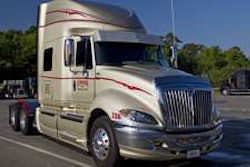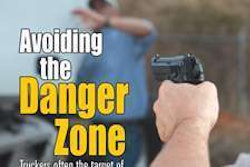Minimize your chances of becoming a victim of crime on the road
It was still dark outside the morning of Feb.17, when Truman Lee Smith arrived at the food warehouse in East St. Louis for a delivery.
He was at least an hour-and-a-half early, and reports say he exited his truck to push the gate buzzer. That’s when a gunman shot the former Marine, who served in Operation Desert Storm, in the chest in an apparent robbery attempt in front of the Fresh Warehousing building.
Police responded to a 911 call and arrived shortly before 6 a.m. to find the trucker lying next to his truck. Smith, from Irondale, Mo., a divorced father of three children and three stepchildren, died later at the hospital. He drove for E&K Truck Services based in St. Clair, Mo., and had been trucking for seven years. St. Louis Police Detective Orlando Ward was one of the first responders. “Here you have a guy who served his country in a war and dies in such a senseless way,” Ward says. “He was a true victim, and we are pulling out all the stops to find his murderer.” Ward interviewed truckers at area truckstops about the crime. “Everyone I talked to said they were extremely upset to hear about the murder. They felt like they had lost one of their own.”

Internet message boards filled with notes of support for his family and grief over the senseless death. One site, DriversAlike.net, encouraged drivers to sign Smith’s guestbook and to read the attacked truckers section, a collection of news reports of violence against truckers around the country. Long-haul trucker Lee and his wife, Danielle [who requested their last name not be used], run the site and say their mission is to raise public awareness of the safety issues faced by their fellow drivers. They are passionate supporters of the passage of Jason’s Law, pending legislation to allocate funds for more safe parking and rest areas, result of another trucker tragically killed on the job. Two years ago, Jason Rivenburg, 35, of Fultonham, N.Y., like Smith, arrived early at the receiver’s. He had to park and wait at a nearby abandoned gas station, where he was shot and killed by Willie Pelzer for the $7 he had on him. He left behind his wife, Hope, and three small children.
The FBI’s preliminary annual crime statistics for 2010 show violent crime in the United States decreased by 6.2 percent compared to 2009, but nobody tracks crimes specifically against truckers. While truckers like Smith and Rivenburg likely never had a chance, security experts say you can minimize your risk for becoming a crime victim on the job.
“The shortage of safe parking is a concern we hope will be rectified with the passing of Jason’s Law.”
— Norita Taylor, spokesperson for the Owner-Operator Independent Drivers Association
Be alert
Security experts believe a heightened sense of awareness of your surroundings is your most effective weapon against an attack. Crimes against truckers are most likely to occur during transitions. Be aware of everything around you, including the reputation of the area where you are stopping.
“Nothing beats being aware of your surroundings,” Ward says. “You should consider every stop a potentially hazardous situation. You never know when you are being watched. In most cases, the criminal knows the area better than you do. He knows exactly when you are vulnerable. Never let your guard down, ever.”
Always be aware of your surroundings when entering and exiting your truck.Sandy Long, a driver for Weston Transportation and the author of the book Street Smarts: A Guide for a Truck Driver’s Personal Safety, says many new drivers are woefully underprepared for the personal safety risks that come with the job. She adds trucking can be compared to a combat zone. “If you don’t have natural street smarts, you need to get them,” she says.
Randy Vruwink, a trucker for 30 years, got a street lesson in September 2010. It was 9:30 p.m. when Vruwink pulled into a truckstop in Levo Junction, Ky., and did a post-trip inspection. He was checking the lock on his trailer when he was grabbed from behind, a knife jammed against his throat. The assailant demanded his cash and wallet. Vruwink didn’t have his wallet on him, but he gave up the $50 in his pocket. “I’ll get my wallet out of the cab,” he offered, but the thief snatched the cash and ran, disappearing into the rows of parked semis. In shock, heart pounding and adrenaline rushing, Vruwink called the police. When he gave his report, he found out there had been three other recent robberies in the area.
Sandy Long has made it her mission to focus on the dangers facing unsuspecting new drivers“It was a big wake-up call for me,” he says. Since the attack, he does his post-trip inspections in daylight, strives to be more aware of his surroundings and plans his trips to park in truckstops with good reputations. Vruwink, a Trucker Buddy ambassador who drives for Bay and Bay Transfer, says he still gets chills when he thinks about how things could have turned out. “I couldn’t wait to get home to my wife and see my grandkids. I’m not going to take my security for granted ever again.”
Lance and Kacie Wood, of Summerfield, Ill., drive team for an armored semi company and are trained in personal protection and commercial vehicle security. Wood, an over-the-road trucker for 13 years, often advises other truckers on their personal security. While he has a federal permit to carry a weapon on board, he believes an overall attitude of security is vital to a trucker’s safety, and being aware of their surroundings is something that can’t be taken for granted.
One of his security practices is to write down the make and model of trucks parked next to him at night, and he strongly urges every trucker to do the same. “If something goes down in the night, you’ll have that information,” he says. One of his buddies was sleeping in a rest area when he was awakened by police. A trucker sleeping in the truck next to him had been robbed and then scalped. The truck on the other side of him was gone, and he was not able to provide police with details about the possible suspect or his truck.
Plan it
Wood says good security practices begin before he starts his trip. “Plan your route down to the last detail. I don’t recommend stopping the truck for the first 150-200 miles in case someone is watching you,” he says. He recommends truckers plan their route to include a safe stopping place and to keep friends, family or dispatch aware of their plan. “You have to let someone know where you are going and what time you expect to be there.” On the other hand, don’t tell random strangers on the Internet or CB radio where you are going. “Never talk about your load, ask directions or talk about your route to a stranger.” Planning includes where you stop for the night. “Never park on a ramp; they are notoriously unsafe,” Wood says.
Lock it
“It sounds simple, but keeping a padlock on your trailer, loaded or unloaded, is a huge deterrent to thieves and one less reason they’ll target you,” Wood says.
Park it
Lisa Mullings, president and CEO of NATSO, says that since 9/11 truckstops have beefed up security and increased the use of cameras. “When people know they are being monitored, it makes for a good deterrent,” she says. She also credits drivers for being perceptive about who should and shouldn’t be lurking around the premises.
“If a driver sees something that’s not right, he should report it immediately,” Mullings says. Major Mark Savage of the Colorado State Police agrees and says, “Your cell phone is one of your best defenses against crime. Call the police if you sense something amiss. Don’t look the other way if you witness a crime.”
Truckers have been attacked by assailants hiding behind and even under trucks at night. “Park under a light and as close to the truckstop as you can. Don’t go out if you see something suspicious,” Savage says.
Sound the alarm
Truckers who travel with dogs say their pet is the best deterrent against crime. “Nobody is going to bother me when Miss Lillie (a 60-pound English bulldog) is around,” Wood says. Even a small dog can act as an alarm, alerting the driver to an intruder. Long says one female driver he knows strings a row of tin cans from door to door so she can hear if someone is trying to break in.
Defend yourself
If the worst happens and you are attacked, use whatever you have in your cab for self-defense. Truckers have various items at their disposal, such as a tire-thumper, heavy-duty flashlight, hammer or fire extinguisher. However, things get complicated if you “plan” to use something illegally — like wasp spray — for self-defense. Mace and even pepper spray are illegal in some states, and legal consequences may be severe. If you plan to carry a stun gun or flare gun, be aware those products are regulated and restricted in some states. Don’t carry something for self-defense if you have not researched its legality in the states you drive through.
Can you carry a gun in your cab?
Nothing stirs a heated debate like truckers carrying firearms for protection. One of the most pervasive myths about this topic is that there’s a federal law against drivers carrying a firearm in a commercial motor vehicle. No such law exists and, in fact, there is law that says you can.
In the federal regulatory code, Title 18 Section 926(a) The Peaceable Journey Act, under Part 1, Chapter 44, states:
Firearms in a truck are always controversial.”Notwithstanding any other provision of any law or any rule or regulation of a State or any political subdivision thereof, any person who is not otherwise prohibited by this chapter from transporting, shipping, or receiving a firearm shall be entitled to transport a firearm for any lawful purpose from any place where he may lawfully possess and carry such firearm to any other place where he may lawfully possess and carry such firearm if, during such transportation, the firearm is unloaded, and neither the firearm nor any ammunition being transported is readily accessible or is directly accessible from the passenger compartment of such transporting vehicle:
“Provided, that in the case of a vehicle without a compartment separate from the driver’s compartment the firearm or ammunition shall be contained in a locked container other than the glove compartment or console.”
However, the federal law is not the issue. According to Allen Smith, author of Truth About Trucking (www.truthabouttrucking.com), truckers have two major hurdles to overcome on this issue: Being legal and not violating any city, county or state law of any place they will be passing through and abiding by company policy.
You have to follow the laws of the jurisdiction you travel through, including city, county and state laws. Most major trucking companies don’t allow firearms in vehicles, and many shippers and receivers absolutely forbid firearms. You can’t transport a firearm across the Canadian border and you can’t take them onto military bases.
Smith frequently addresses this topic on his Internet radio show and website and says many drivers will argue the Peaceable Journey Act protects them from violating city, county or state laws they are passing through. Smith contends local law enforcement doesn’t see it this way. They are “not interested in federal law,” Smith says. “They are only interested in upholding the laws within their jurisdiction. Furthermore, not all states recognize a concealed permit. California and New Jersey do not recognize a concealed permit to carry from Florida, and if I’m caught in California or New Jersey with a legal firearm in my truck, I’m in violation of their laws. Between restrictive company policies and a wide range of varying state and local laws, there’s a lot for a trucker to consider.”
The restrictions don’t deter some truckers. In a recent etrucker.com online poll, 31 percent of respondents said they carry a firearm for protection. Armed truckers interviewed for this story say they are proficient with their weapons, carefully research the laws of the states/cities where they drive and respect law enforcement.
Chuck Winborn, an owner-operator from Birmingham, Ala., has a Concealed Carry Weapon license and says he’s a responsible gun owner. The 51-year-old has been driving for 26 years and says he carries either a Glock or a Taurus 9mm or 40. He runs a dedicated route from his home state through Mississippi, Tennessee. and Arkansas, all states that have reciprocity with Alabama. He says he follows the law and keeps the gun unloaded and out of reach while driving.
“If you understand that you can only use deadly force if you are in fear of your life due to a break-in or attack, generally you will be justified in protecting yourself.” He reiterates what many truckers say, “I’d rather be judged by 12 than carried by six.”
While Winborn feels safer with his weapon, he’s also an advocate of the common sense approach to security. “I park in well-lighted areas that have truck parking and never on highway ramps or secluded areas in truckstops. I always use a small ratchet strap and hook it on both door handles to prevent someone from busting my glass and opening the door. I also cover my windshields with chrome bubble insulation so no one can look inside.”
Dan Tuck, an owner-operator from Molalla, Ore., hauls high-dollar cargo but believes he’s safer using his brains rather than a weapon and says he’s always on high alert. “I am extremely aware of my surroundings, alert and careful. I think being proactive rather than reactive is what keeps you safe,” Tuck says.
Sandy Long, who is a gun owner, agrees with Tuck and doesn’t consider the hassle and potential danger of carrying a weapon in her truck worth it. “I believe that if you educate yourself about the potential dangers out there and act in a way that’s both street smart and defensive, you have the best chance of arriving alive,” she says.
Have you ever been the victim of a crime while on the job?
YES — 44%
NO — 56%
Source: etrucker.com poll, 54 responses
Safe trucking
A recent Truckers News poll asked readers what they carry in their truck for protection.
Tire Thumper — 35%
Firearm — 31%
Nothing — 27%
Pet — 4%
Mace — 3%
Source: etrucker.com poll, 142 responses
Below is a list of some sources about gun rights:
• http://www.nraila.org/recmap/usrecmap.aspx
• www.truckersalike.wordpress
• www.truckersalike.net
• www.stungunlaws.org









